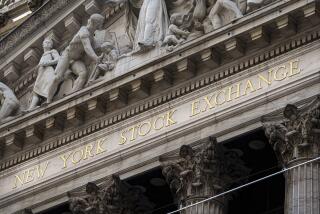Stocks tumble worldwide on fears of Eurozone blow-up
The latest turn in Europe’s financial crisis may dash any hope of taming the stock market’s extreme volatility soon.
Share prices took another tumble worldwide after the Greek government called for a voter referendum on the terms of the country’s bailout by the rest of Europe.
The unexpected announcement raised the risk of a thumbs-down by austerity-weary Greek voters. That could mean the end of Greece’s membership in the Eurozone, and a disastrous default on the country’s heavy debt obligations to the rest of the continent.
The vote isn’t expected until January — meaning “a new three-month cloud of uncertainty over the markets,” said Phil Orlando, chief equity strategist at Federated Investors in New York. “We thought we had this thing put to bed” three days ago, he said.
The Dow Jones industrial average plunged 297.05 points, or 2.5%, to 11,657.96 on Tuesday. After Monday’s 2.3% slump, the Dow now has given back all of last week’s 3.6% surge, and then some. The index is at its lowest level since Oct. 20.
Investors weary of the wild swings that have rocked the market since late July shouldn’t expect any relief in the near term, said Rick Bensignor, chief market strategist at Merlin Securities in New York.
“The message is, it’s a trader’s market. It isn’t an investor’s market,” he said.
Some investors rushed for a second day to buy Treasury bonds as a haven, driving the yield on the benchmark 10-year T-note to 1.99%, down from 2.11% on Monday and the lowest since Oct. 6.
The U.S. dollar also offered sanctuary, rising strongly for a second day. That helped to depress commodity prices because a rallying dollar means raw materials become more expensive for foreign buyers.
Gold, usually a hide-out in times of trouble, lost $13.20 to $1,711 an ounce.
Stock markets had soared Thursday after European leaders agreed on a new plan to end their 2-year-old debt crisis. A key element of the plan: expansion of a $600-billion rescue fund for struggling member countries and banks.
By boosting the firepower of the fund to $1.4 trillion, leaders hoped to convince investors that they could backstop not only Greece but the larger troubled economies of Spain and Italy.
But analysts warned at the time that many details about the fund were left to be filled in — leaving Europe at risk of another shock.
The potential for Greece’s previously negotiated bailout to unwind deepened fears that Eurozone authorities can’t stop the spread of the debt crisis to Italy, the world’s third-largest bond market after the U.S. and Japan.
Market interest rates on Italian government bonds continued to rise Tuesday, a sign that investors are increasingly worried about Italy’s creditworthiness.
The yield on 10-year Italian bonds jumped to 6.19%, up from 6.09% on Monday and 5.49% four weeks ago.
Italian stocks were the worst performers among major Eurozone markets, diving 6.8% on Tuesday after a 3.8% drop Monday.
Stocks fell broadly across Europe. The German market lost 5.0%, French shares slumped 5.4% and the Spanish market dropped 4.2%.
On Wall Street, falling stocks outnumbered winners nearly 6 to 1 in heavy trading. The Nasdaq index plunged 2.9%; the Standard & Poor’s 500 index sank 2.8%.
Stocks also were under pressure from a report that U.S. factory activity was weaker than expected.
October manufacturing activity grew at a slower pace than in September, the Institute for Supply Management said. The institute’s activity index was 50.8 for October, down from 52.0 the previous month. Any level above 50 represents expansion, while an index below 50 shows contraction.
Despite the factory report, much of the economic data in recent weeks have pointed in the same direction: The U.S. is growing at a modest pace and doesn’t appear to be in danger of falling back into recession.
With Federal Reserve policymakers coming out of a two-day meeting Wednesday, most analysts caution that investors shouldn’t expect any new help for the U.S. economy or markets from the central bank.
“The problems are abroad,” said Justin Lederer, interest-rate strategist at brokerage Cantor Fitzgerald in New York.
The Fed in September decided to shift more of its massive securities portfolio toward longer-term Treasury bonds to pull down long-term interest rates in general. And some Fed officials have hinted in recent weeks that they could launch a new program to buy mortgage-backed bonds to further help the housing market.
But most Fed watchers don’t expect any such move Wednesday.
“I think they will just continue to say they have the tools available” to do more, Lederer said.






